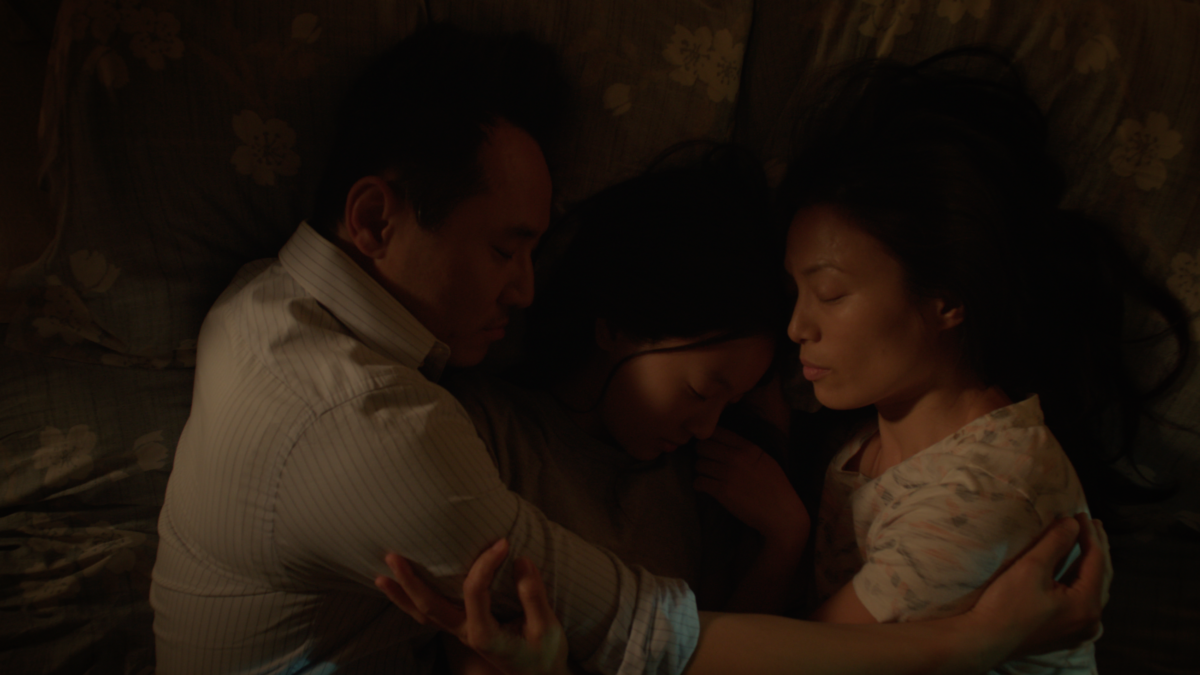Written By: Beatrice Viri
The 42nd Asian American International Film Festival featured several thoughtfully made shorts with the “Shorts: Made in NY” program. Though they spanned different genres, one factor united these shorts in particular: all films were directed by talented local filmmakers from New York City. New York served as the backdrop for most of these films, but the setting was important in some more than others.
New York City is known for being incredibly expensive to live in, especially in Manhattan — most young people and even families can no longer live without renters and roommates as property values continue to rise. “An American Family” by Truong Phan Kieu-Anh is the perfect depiction of this concept. This short is about a Filipina tenant who lives with a black household, comprising of a single mother and her son.
New York City is also known for its diversity. In “An American Family”, we see an unlikely group of people fit together intimately. Giving a simple glimpse into the unnamed family’s daily lives, the short reminds us that no matter how unconventional or different people are, they can be family as long as they care for each other.
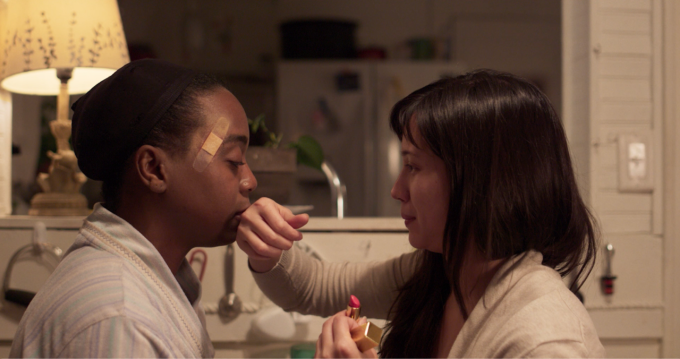
Zishun Ning’s “24 Hour Workday” also touches upon family, though in a much more complicated way. The short yet thoughtfully put together documentary is about homecare workers being exploited for their labor and not receiving their wages. This is an issue occurring everywhere, but specifically deals with New York’s laws. We are given the strenuous accounts of domestic workers, whose health has been virtually destroyed because of these 24-hour shifts. We also see a sense of obligation to their employers, who they may also regard as family as they cannot spend time with their own.
Homecare workers largely consist of immigrants desperately in need of work, forced to take on these shifts for their family’s survival. However, because of the 24-hour, five-day work week, cannot spend time with their families and cannot rest due to the constant alertness required for the job. There are many complexities to the legal issues, but some things are certain: the New York State Department of Labor has continued to suppress these workers, and the companies that take on homecare workers have neglected their basic human rights. Informative and thought-evoking, the short highlights their struggles as the fight continues on.
Which then takes me to the short “Due” by filmmaker Anna Mikami set in a familiar Chinatown that briefly touches upon a prevalent political issue. “Due” is about Kai, a legal immigrant, who faces charges for helping his undocumented friend escape when two white customers call an ambulance for an accident at their work. Cherry, his girlfriend, is pregnant, and the two attempt to make the most of their lives before he is inevitably incarcerated.
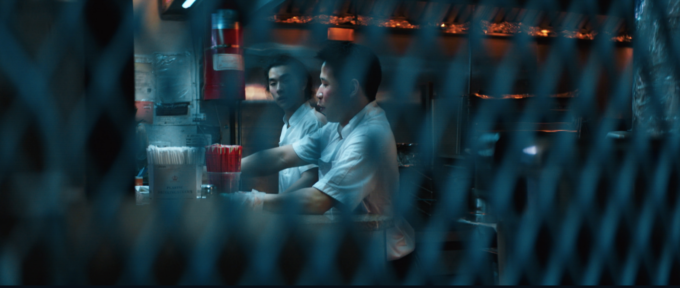
It’s a tale that spans only a little more than ten minutes, but manages to evoke a number of emotions — euphoria and longing, but with a sense of foreboding bleakness. Chaotic and beautiful, Chinatown was carefully picked for its setting. The director and lead actress Anna Mikami says she wanted to illustrate the diversity of Chinatown: “A lot of people think that Mandarin speaking people only speak with Mandarin speaking people, but in Chinatown, it’s different. I wanted to display that in ‘Due’ — Cantonese speakers and Mando speakers, even Italian, all mix together.”
Taking the previous shorts into account, we are again given the beautiful diverse mosaic New York City is. New York City is home to all types of people and the “Shorts: Made in NY” thus far are a showcase of this phenomenon, of the types of people that inhabit this city, and of the problems they may face.
“Secret Lives of Asians at Night” directed by KEFF makes this diversity a little more complicated. We continue to explore Chinatown, with Koreatown and Sunset Park added into the mix. We also hear different tongues spoken between the characters (Japanese, Korean and Chinese). While it may be unrealistic that each character can understand each other despite speaking different languages, it was a conscious creative decision. This decision highlights the tensions between the three different cultures, and then unites them as they overcome their differences to battle an oppressive force.
As an Asian audience, we are aware that each language is different, though this subtlety could be harder to pick up for non-Asian viewers. Even so, the short is a wonderful celebration of Asian groups coexisting and also breaches an extremely important subject. In order to focus on “Asian solidarity,” we also need to be aware that there’s an uncomfortable, unspoken hierarchy between many AAPI groups, something largely ignored in general Asian American activism.
East Asians regard those who aren’t East Asian with a sense of superiority, so I admit that I am already sensitive to this issue as a light-skinned Southeastern Asian. But, due to the complicated history of imperialism and pain of war, there are also many hostilities between East Asians. “Secret Lives of Asians at Night” highlights this perfectly with all of the disputes and passing racial insults between characters. It’s less relevant to younger generations (but still persists), but with older generations, antagonism is still present at times. I’m glad that “Secret Lives of Asians at Night” brought some attention to the discrepancy and ended with the notion of solidarity; it’s again important to be sensitive to these topics.
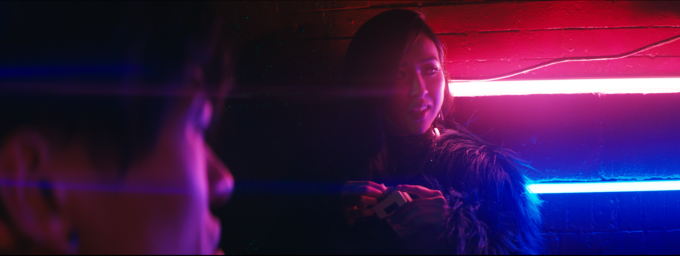
Now, Bertha Bay-Sa Pan’s“Lucy in the Sky with Diamonds” is probably the one film that does not have a majority Asian cast, only starring Kelly Hu. But that doesn’t mean it ignores highlighting minority groups. In just a short 12 minutes, we are given a portrait of a girl with autism, Lucy, as she attends her first public school. However, her family is conflicted on the decision as they do not think Lucy has adjusted. Their situation is especially unique because Lucy’s twin, Rachel, does not have autism.
The family resides in New York City, and Kelly Hu’s character serves as Lucy’s doctor, who asks the twins to partake in a study. Unlike the other films thus far, the setting is not as significant, though relieving to the family as Lucy is able to access more resources and was able to attend a specialized school.
Lucy attempts to adjust socially, though the feat is difficult. In a scene where she’s especially overwhelmed, the camera shakes and voices collide. We are also constantly given shots highlighting her mannerisms, where she bites her sleeve nervously. Sensitive and told partially in first-person, we are painted with the picture of living with autism.
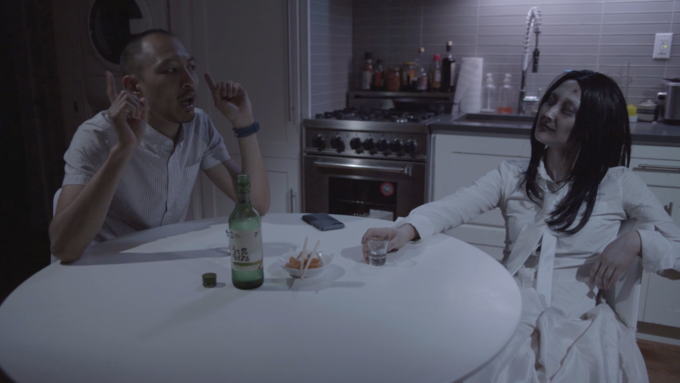
The two remaining shorts, “Ghost” and “End of Summer” don’t utilize the setting of ‘New York’ as a plot asset, unlike those previously mentioned. However, both deal with the topics of diaspora, a shout-out to the “Asian American” part of our festival.
“Ghost” by SJ Son and Woody Fu is a hilarious five-minute short about a ghost and an Asian American, who bond over their similarities of being alienated and othered. Being an Asian American is considered a ‘purgatory’ of sorts, being in the middle of two worlds — which is exactly what being a ghost is.
SJ Son says: “We wanted to highlight being Asian American in a humorous way.” The entire theater was in hysterics over the sheer relatability, so Son and her co-performer and co-director Woody Fu definitely delivered.
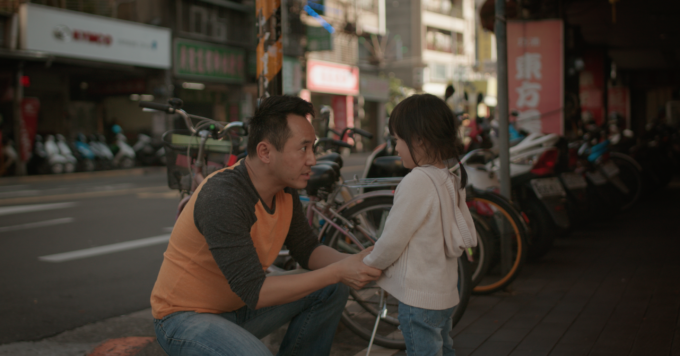
Finally, “End of Summer” directed by Serena Kuo is far from New York, shot mostly in California and Taipei. Similarly to “Ghost,” “End of Summer” takes place between two worlds, quite literally and figuratively as the main character detaches from her parents. However, “End of Summer” holds a darker, subtler tone, contrasting against the humorously narrated “Ghost” significantly. Dawn is about to set off for college and her parents drive with her to transport her stuff, until an unexpected atrocity happens to her father.
Though it was short, “End of Summer” displayed so much emotion, of insecurity, of pain. The film switches between both the present and past when the family used to live in Taipei. Opening with an enigmatic scene akin to horror as Dawn and her mother think they’re lost, it ends up being a bittersweet tale of familial love, one with uncertainty of the looming future.
Highlighting issues prevalent in our communities with an added touch of New York, the “Shorts: Made in NY” program this year included many remarkable shorts from talented local filmmakers. They encompassed all genres, and showcase the many diverse stories that New York and its artists have to tell.
There will be a special encore presentation of the “Shorts: Made in NY” program on Friday, August 23rd at 7pm as part of Asian American International Film Festival’s “Flushing Encore” series.
RSVP here. Tickets are free and seats are first-come first-serve.
*Michelle Ahn also contributed to this piece

